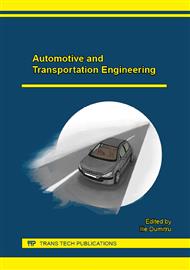[1]
R. Brittaine, N. Lutaladio, A Smallholder Bioenergy Crop, in: Integrated Crop Management, Vol. 8, FAO, Rome, (2010).
DOI: 10.1017/s0014479710000542
Google Scholar
[2]
M. Mofijur, H. Masjuki, M. A. Hazrat, A.M. Liaquat, M. Shahbuddin, M. Varman, Prospects of biodiesel from jatropha in Malaysia, Renewable and Sustainable Energy Reviews. 16 (2012) 5007-5020.
DOI: 10.1016/j.rser.2012.05.010
Google Scholar
[3]
F. U. M. Allah, Comparative analysis of physical and chemical properties of jatropha oil, Bulletin of the University of Transilvania of Brasov. 8(57) (2015) 37-42.
Google Scholar
[4]
G. B. Adebayo, O. M. Ameen, L. T. Abbas, Physico-chemical properties of biodiesel produced from Jatropha Curcas oil and fossil diesel, J. Microbiol. Biotech. Res. 1(1) (2011) 12-16.
Google Scholar
[5]
G. Paul, A. Datta, B. K. Mandal, An experimental and numerical investigation of the performance, combustion and emission characteristics of a diesel engine fueled by jatropha biodiesel, Energy Procedia. 54 (2014) 455-467.
DOI: 10.1016/j.egypro.2014.07.288
Google Scholar
[6]
D. Agarwal, A.K. Agarwal, Performance and emission characteristics of jatropha oil (preheated and blends) in a direct injection compression ignition engine, Applied Thermal Engineering. 27 (2007) 2314-2323.
DOI: 10.1016/j.applthermaleng.2007.01.009
Google Scholar
[7]
A. P. Olteanu, Particularities of investment projects in the Romanian biodiesel industry, Review of International Comparative Management. 12 (2011) 977-985.
Google Scholar
[8]
J. V Eijck, H. Romijn, A. Balkema, A. Faaij, Global experience with jatropha cultivation for bioenergy: An assessment of socio-economic and environmental aspects, Renewable and Sustainable Energy Reviews. 32 (2014) 869-889.
DOI: 10.1016/j.rser.2014.01.028
Google Scholar
[9]
E. Kuntashula, D. Horst, S. Vermeylen, A pro-poor biofuel? Household wealth and farmer participation in jatropha curcas seed production and exchange in eastern Zambia, Biomass and Bioenergy. 63 (2014) 187-197.
DOI: 10.1016/j.biombioe.2014.01.051
Google Scholar
[10]
A. S. Silitonga, A. E. Atabani, T. M. I. Mahlia, H. H. Masjuki, I. A. Badruddin, A review on prospect of jatropha curcas for biodiesel in Indonesia, Renewable and Sustainable Energy Reviews. 15 (2011) 3733-3756.
DOI: 10.1016/j.rser.2011.07.011
Google Scholar


